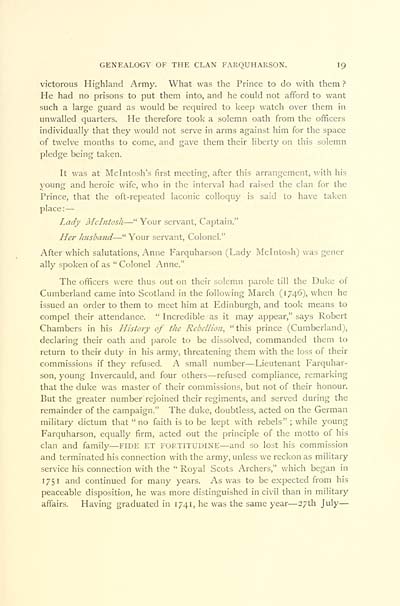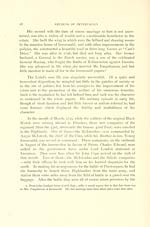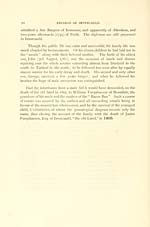Download files
Complete book:
Individual page:
Thumbnail gallery: Grid view | List view

GENEALOGY OF THE CLAN FARQUHARSON. I9
victorous Highland Army. What was the Prince to do with them ?
He had no prisons to put them into, and he could not afford to want
such a large guard as would be required to keep watch over them in
unwalled quarters. He therefore took a solemn oath from the officers
individually that they would not serve in arms against him for the space
of twelve months to come, and gave them their liberty on this solemn
pledge being taken.
It was at Mcintosh's first meeting, after this arrangement, with his
young and heroic wife, who in the interval had raised the clan for the
Prince, that the oft-repeated laconic colloquy is said to have taken
place: —
Lady Mcintosh — " Your servant, Captain."
Her husband — " Your servant, Colonel."
After which salutations, Anne Farquharson (Lady Mcintosh) was gencr
ally spoken of as " Colonel /Vnne."
The officers were thus out on their solemn parole till the Duke of
Cumberland came into Scotland in the following March (1746), when he
issued an order to them to meet him at Edinburgh, and took means to
compel their attendance. " Incredible as it may appear," says Robert
Chambers in his History of the Rebellion, "this prince (Cumberland),
declaring their oath and parole to be dissolved, commanded them to
return to their duty in his army, threatening them with the loss of their
commissions if they refused. A small number — Lieutenant Farquhar-
son, young Invercauld, and four others — refused compliance, remarking
that the duke was master of their commissions, but not of their honour.
But the greater number rejoined their regiments, and served during the
remainder of the campaign." The duke, doubtless, acted on the German
military dictum that "no faith is to be kept with rebels" ; while young
Farquharson, equally firm, acted out the principle of the motto of his
clan and family — FIDE ET FORTITUDINE — and so lost his commission
and terminated his connection with the army, unless we reckon as military
service his connection with the " Royal Scots Archers," which began in
1 75 1 and continued for many years. As was to be expected from his
peaceable disposition, he was more distinguished in civil than in military
affairs. Having graduated in 1741, he was the same year — 27th July —
victorous Highland Army. What was the Prince to do with them ?
He had no prisons to put them into, and he could not afford to want
such a large guard as would be required to keep watch over them in
unwalled quarters. He therefore took a solemn oath from the officers
individually that they would not serve in arms against him for the space
of twelve months to come, and gave them their liberty on this solemn
pledge being taken.
It was at Mcintosh's first meeting, after this arrangement, with his
young and heroic wife, who in the interval had raised the clan for the
Prince, that the oft-repeated laconic colloquy is said to have taken
place: —
Lady Mcintosh — " Your servant, Captain."
Her husband — " Your servant, Colonel."
After which salutations, Anne Farquharson (Lady Mcintosh) was gencr
ally spoken of as " Colonel /Vnne."
The officers were thus out on their solemn parole till the Duke of
Cumberland came into Scotland in the following March (1746), when he
issued an order to them to meet him at Edinburgh, and took means to
compel their attendance. " Incredible as it may appear," says Robert
Chambers in his History of the Rebellion, "this prince (Cumberland),
declaring their oath and parole to be dissolved, commanded them to
return to their duty in his army, threatening them with the loss of their
commissions if they refused. A small number — Lieutenant Farquhar-
son, young Invercauld, and four others — refused compliance, remarking
that the duke was master of their commissions, but not of their honour.
But the greater number rejoined their regiments, and served during the
remainder of the campaign." The duke, doubtless, acted on the German
military dictum that "no faith is to be kept with rebels" ; while young
Farquharson, equally firm, acted out the principle of the motto of his
clan and family — FIDE ET FORTITUDINE — and so lost his commission
and terminated his connection with the army, unless we reckon as military
service his connection with the " Royal Scots Archers," which began in
1 75 1 and continued for many years. As was to be expected from his
peaceable disposition, he was more distinguished in civil than in military
affairs. Having graduated in 1741, he was the same year — 27th July —
Set display mode to: Large image | Transcription
Images and transcriptions on this page, including medium image downloads, may be used under the Creative Commons Attribution 4.0 International Licence unless otherwise stated. ![]()
| Publications by Scottish clubs > New Spalding Club > Records of Invercauld MDXLVII - MDCCCXXVIII [1547- 1828] > (39) Page 19 |
|---|
| Permanent URL | https://digital.nls.uk/81582336 |
|---|
| Description | Volumes 47-53 are uniform with but not part of the club's series. |
|---|---|

